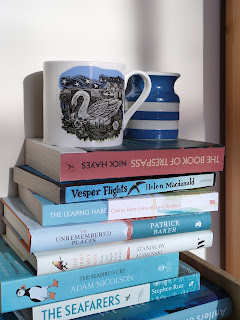These were heavily inspired by Gill Meller's Elderflower and Gooseberry pancakes in his new book 'Outside', but I had to be up early and wait in for a man to come and inspect my front door to make sure it was fireproof (everything is fine apart from the hinges which are apparently some sort of not fireproof metal) and I didn't have any gooseberries.
There are elder bushes just outside our building so I gathered 4 flower heads and gave them a wash - the smell was amazing, and then used my normal pancake mix (200g of self-raising flour, a pinch of salt, a melted knob of butter - about an ounce - and added milk until I was happy with the consistency - spoonable, not too runny not too stiff). I added the grated rind of a lemon, the flowers from a couple of the elderflower heads, and a stick of rhubarb chopped into roughly 1cm chunks.
If you have a decent nonstick frying pan you shouldn't need any oil for making pancakes and I much prefer them without - they just need to go on a medium heat and get a couple of minutes on each side, I also prefer not to add sugar or sweeteners to the batter mix, with rhubarb it means it keeps its sourness for a much better contrast with the syrup. For the syrup I added a bit of elderflower cordial to maple syrup, but I'd also use honey on these depending on what's open, and some of the leftover flowers.
I really liked these, they absolutely tasted of early summer/late spring. The scent of the elderflower was incredible, better even than coffee for waking me up this morning and rhubarb is great in pancakes - it just has time to go soft and I love its tartness against maple syrup.


%5B11323%5D.png)



